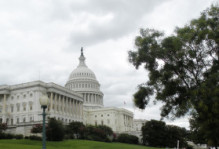Leadership: What I Learned During the DC Summer Institute on Leadership, Part 1
Leadership, (a) an influencing process—and its resultant outcomes—that occurs between a leader and followers and (b) how this influencing process is explained by the leader’s dispositional characteristics and behaviors, follower perceptions and attributions of the leader, and the context in which the influencing process occurs. This is how leadership is defined in The Nature of Leadership, a well-respected academic investigation into leadership, written by David Day and John Antonakis.
Our DC Summer Institute on Leadership and Community Engagement investigated this further by means of site visits with leaders in the DC area. In a public speaking format with a post-speech group question and answer, we learned what leadership means from the perspective of prominent leaders in politics, the military, private sector, and in non-profit organizations. Captain John Burnham of the US Naval SEALS, FBI Director James Comey, President of the National Cable & Television Association, Michael Powell, DC Central Kitchen’s Director of Development, Alexander Moore, and Luke Albee, Chief of Staff to US Senator Warner were just some of these exemplary leaders.
We learned more from the academic side of leadership by studying a few commonly accepted theories: The Social Change Model of Leadership Development, which emphasizes these cardinal values of leadership: Consciousness of Self, Congruence, Commitment, Collaboration, Common Purpose, Controversy with Civility, Citizenship, and Change. The Five Practices of Leadership (from Nature of Leadership), which include Model the Way, Inspire a Shared Vision, Challenge the Process, Enable Others to Act, & Encourage the Heart. Both of these theories explain characteristics and behaviors that comprise effective leadership.
My favorite quote on leadership comes from a man who died over 2000 years before these theories or the greats leaders whom we met were even born – Ancient Chinese Philosopher, Lao-Tzu. Lao-Tzu said, “A leader is best when people barely know he exists, when his work is done, his aim fulfilled, they will say: we did it ourselves.” This sounds manipulative at first read, but it is about influencing others to accomplish some objective – it’s about empowering them.
As a non-traditional college student at William & Mary, I have had some real experience being in a leadership position, albeit in minor roles. My first experience as a leader came when I was 12 years old and the eldest of four siblings. My family raised Great Dane puppies for supplemental income, and because I was the oldest, I was in charge of ensuring chores, like feeding and watering the animals and cleaning their kennels, were completed by myself and my sisters. I was also an Assistant Operations Manager for a small marketing firm at age 20, a squad leader in the U.S. Army at age 22, and the Front Office Supervisor of a veterinary clinic at age 28.
At the puppy mill, my exemplary leadership led to me doing all the work because my sisters wouldn’t listen to me. In the Army, my squad definitely knew about my existence when I misled them during a marching movement. The result of my great assistant management at the marketing firm led to me getting terminated and replaced by someone more experienced. Maybe all those experiences finally taught me something or maybe it was maturity, but it was only at age 28 when I was working as a front office supervisor that I felt I was truly a leader. I helped new staff excel at their jobs and made improvements to the hospital that still exist today.
But exactly what was it that made that experience my only real leadership experience? After studying leadership theory, listening to speeches about it from prominent figures in the Washington D.C. area, and reflecting on my own experiences, I wanted to learn what the leaders with whom I worked thought about leadership. I carefully selected two people from D.C. Central Kitchen, where I am doing my summer internship, to interview: Sarah Riley, Program Manager of D.C. Central Kitchen’s Culinary Job Training Program and Mike Curtain, Chief Executive Officer of D.C. Central Kitchen.
Comments are currently closed. Comments are closed on all posts older than one year, and for those in our archive.




Hi Mark,
This is true, but the main point of the post is a background framework for me to post my leadership interviews with DCCK staff. The 2nd of 3 parts will be up tomorrow.